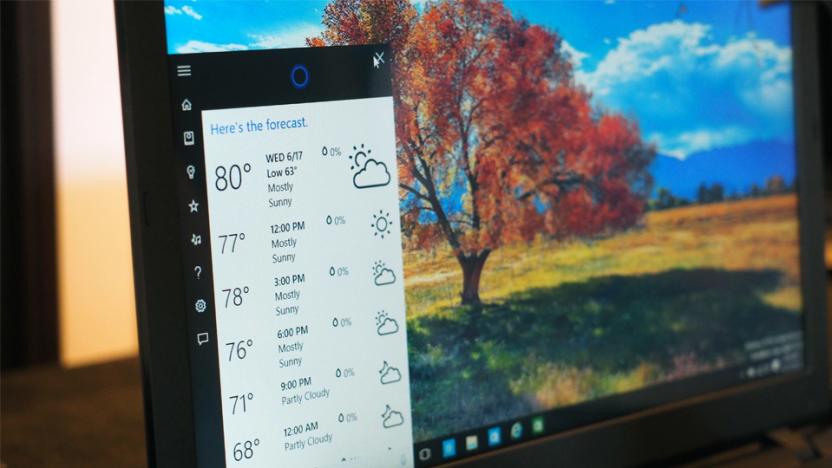mcafee
Latest

Microsoft, McAfee and others form a ransomware task force
They hope to create a standardized framework for responding to attacks.

Chinese hackers impersonated McAfee to attack election campaign staffers
Google says that Chinese state hackers impersonated McAfee to trick election campaign workers into installing malware.

John McAfee arrested for tax evasion, charged by SEC for touting ICOs
John McAfee has been arrested in Spain, and faces charges for tax evasion, failure to file taxes and promoting cryptocurrency without admitting he had a financial interest in it.

Multiple antivirus apps are vulnerable to common security flaws
At least 28 well-known antivirus apps could be exploited by shared security flaws, and a few are still vulnerable now.

Your obsession with celebrities is helping scammers spread spam
Internet scammers will do just about anything to get a foothold on your home computer or mobile device, whether it's impersonating a work colleague, building fake websites for real products to steal credit card information, or posing malware as a legitimate app. One of their most tried and true ploys, though not particularly sophisticated, is exceedingly effective and involves promising nudes pictures or free episodes of shows and movies from today's top Hollywood talent.

A 19-year-old WinRAR bug is being used to install malware
Last month, a 19-year-old bug was discovered in WinRAR, a software used to extract .zip and other file archives on your Windows PC. The company was quick to patch the bug, but users who haven't updated to version 5.70 are still vulnerable. Now, opportunistic hackers are taking advantage of that. McAfee, a global software security company, revealed in a blog post that it has identified more than 100 unique exploits, with most of the targets in the US.

US bill forces tech companies to disclose foreign software checks
Technology companies could soon be forced to reveal if they have allowed agencies in countries such as China and Russia to closely examine their software. The legislation -- part of the Pentagon's spending bill -- was drafted in response to a Reuters investigation last year which found that in order to sell to the Russian market, some software makers had allowed a Russian defense agency to hunt for vulnerabilities in software also used by some US government agencies.

Dark web shop was selling access to a major airport's security systems
While McAfee's Advanced Threat Research team was looking into dark web marketplaces, it found a number of shops offering stolen access to various companies' and groups' systems. Disturbingly, among the findings was access to a major international airport's systems, which could be bought for the low price of just $10. McAfee said the shop appeared to be offering access to the airport's security systems as well as its building automation, surveillance and transit systems.

Cortana can be used to hack Windows 10 PCs
Cortana might be super helpful at keeping track of your shopping lists, but it turns out it's not so great at keeping your PC secure. Researchers from McAfee have discovered that by activating Cortana on a locked Windows 10 machine, you can trick it into opening up a contextual menu which can then be used for code execution. This could deploy malicious software, or even reset a Windows account password.

Your modern car might be as vulnerable as the first iPhone
Over 10 years ago, the first iPhone burst on the scene and changed mobile computing forever. But it had a flaw: The baseband (the part that manages all the radios) on the installed Infineon chip could be exploited to run the phone on networks other than AT&T -- which was, at the time, the exclusive provider. Fast-forward to 2017 and that same chip was recently found in various Nissan Leafs built between 2011 and 2015.

John McAfee settles Intel lawsuit over the rights to his name
John McAfee made headlines last year for a bunch of reasons, including a short-lived attempt to run for President of the United States. He also sued Intel for the right to use his name, six years after he sold his eponymous anti-virus company to the tech titan for billions. As they say, though, all's well that ends well now that the two have decided to settle things amicably. According to Reuters, the two parties already signed an agreement and US District Judge Paul Oetken in Manhattan dismissed his lawsuit and Intel's countersuit as a result. Under the agreement, McAfee can continue using his name -- so long as it's not for or related to cybersecurity and security products and services.

Symantec refuses Russia request for source code access
Security firm Symantec will no longer allow Russian authorities to inspect its source code, according to Reuters. "It poses a risk to the integrity of our products that we are not willing to accept," the company's Kristen Batch said. The worry is that by allowing the supposedly independent Federal Security Service (FSB) to examine source code, it would give Russia an inside view of potential software vulnerabilities and exploits.

John McAfee claims he can read encrypted messages on Android (updated)
John McAfee is already many things -- entrepreneur, presidential hopeful, alleged criminal. However, you might have to add one more item to that list: the co-discoverer of a potentially major Android security flaw. He and a team in Colorado claim to have found a hole in Google's mobile platform that lets them read encrypted WhatsApp messages (and those from other services, for that matter), rendering its privacy safeguards pointless. McAfee is saying precious little about how the intrusion works, but he supposedly gave Cybersecurity Ventures enough details to suggest that the story might hold up.

John McAfee says he'll have 'no problem' becoming president
You know that it's a topsy-turvy year when John McAfee isn't the most preposterous candidate vying for the White House. The antivirus millionaire has been talking up his chances with US News and believes that he'll have "no problem" becoming president. He feels that America's dissatisfaction with the current political process gives a third-party candidate like himself a genuine shot at the title. In fact, he feels that if he can't win in 2016, then "the Libertarians should just give up."

John McAfee is running for president in 2016
Oddball anti-virus software pioneer and self-described "eccentric millionaire" Joh McAfee is throwing his hat into the increasingly crowded field of candidates for the 2016 presidential election. The Hill reports that McAfee filed paperwork to run for president with the Federal Election Commission today and says that campaign director Kyle Sandler confirmed the application's authenticity. Shortly afterwards, McAfee himself launched what appears to be a new campaign website and said on Twitter that he'd make an "official announcement" tomorrow at 6PM ET.

John McAfee's latest project is yet another secure messaging app
Now that John McAfee's days of running from the law appear to be over, he's been left with plenty of time to slam the company he founded and mull over products that originally made him famous. We've already heard about DeCentral, a pocket-sized device that's designed to block government agencies by creating secure private networks (that we've yet to lay eyes on), but the anti-virus pioneer has also been working on some new software tools too. One of those is Chadder, a secure messaging app that joins a long list of existing encryption-toting messaging services (think Wickr or Telegram) that promise to stop your communications from being spied upon by the NSA and other nefarious types.

John McAfee wants to NSA-proof the internet with a device called Decentral
The name McAfee is synonymous with the ubiquitous anti-virus software, but in recent years, John McAfee has kept a relatively low profile in the tech industry, preferring instead to take up leisurely pursuits like yoga and evading Belizean police. Until now. Last Saturday, McAfee took the stage at the San Jose McEnery Convention Center to announce his intention to design and manufacture Decentral, a pocket-sized device priced at around $100 that would, in theory, make it difficult for governmental agencies to snoop on your online activities by creating so-called floating networks. According to the San Jose Mercury News, McAfee told an eclectic crowd of engineers and artists, "There will be no way [for the government] to tell who you are or where you are." A gadget like Decentral does sound like a bit of a timely pipe dream, and McAfee admits that the prototype has yet to be produced. But, hey, if you can dream it, then maybe, just maybe, McAfee can do it.

The Engadget Show 45: Security with Cory Doctorow, John McAfee, Microsoft, the EFF and more!
Welcome to the wild world of security and surveillance. From CCTV to massive government spying initiatives, there's no escaping it. Recent high-profile leaks have served as a sobering reminder of just how present it is in all of our lives, so we figured what better time to take a deep dive? We kick things off with one of the strangest (and raciest) segments in Engadget Show history: a visit to the set of John McAfee's latest web video. The one-time security software guru and fugitive discusses the state of antivirus, bath salts and offers some unsolicited advice to Edward Snowden, one exile to another. Trevor Timm of the Electronic Frontier Foundation sits down for an animated discussion of recent NSA surveillance revelations, including a breakdown of which major tech companies are doing right by their user base. Boing Boing editor, sci-fi author and privacy activist Cory Doctorow climbs a tree in San Diego to discuss Wikileaks, the NSA, the "surveillance state" and more. "Edward Snowden is a hero," he begins, not speaking on behalf of the EFF, mind you -- and things get really good from there. Cryptographer and computer security specialist Bruce Schneier also chimes in on wiretapping, whistleblowing and "security theater." Next up, we pay a visit to The New Yorker's midtown office to talk Strong Box, the magazine's secure deposit box for anonymous whistleblowers. The team behind Ubisoft's Watch Dogs joins us to discuss partnering with computer security company Kaspersky to bring a realistic portrait of the world of hacking to its much anticipated title. And one-time hacker turned head of security community outreach at Microsoft, Katie Moussouris, discusses Redmond's Bluehat bounty program and working with the hacking community to build safer software. All that, plus the usual prognosticating from resident philosopher John Roderick in this month's Engadget Show, just after the break.

McAfee shows how major Android scamware ticks, prevents us from learning first-hand
Most Android malware lives in the margins, away from Google Play and the more reliable app shops. It's nonetheless a good idea to be on the lookout for rogue code, and McAfee has stepped in with thorough explanations of how one of the most common scamware strains, Android.FakeInstaller, works its sinister ways. The bait is typically a search-optimized fake app market or website; the apps themselves not only present a legitimate-looking front but include dynamic code to stymie any reverse engineering. Woe be to anyone who's tricked long enough to finish the installation, as the malware often sends text messages to expensive premium phone numbers or links target devices to botnets. The safeguard? McAfee would like you to sign up for its antivirus suite, but you can also keep a good head on your shoulders -- stick to trustworthy shops and look for dodgy behavior before anything reaches your device.

Verizon intros Mobile Security app for Android, wants to keep you safe
McAfee's been offering mobile protection services on Android for a while now, but Verizon's taking it a step further and bringing an application tailored specifically for its own customers with help from the Intel-owned outfit. The Mobile Security app -- which is also powered by Asurion -- aims to assist the Big Red crowd by protecting their devices from many "digital and physical threats," giving Android (2.1 or later) users the ability to lock, set up alarms, wipe data and locate handsets remotely. As it stands, Verizon's splitting the Mobile Security utility into three different setups, including a free-of-charge Basic, the Premium for $2 per month and, for those who want to be extra careful, a Premium with Total Equipment Coverage that adds a $1 monthly charge to the current TEC fees. We'll let your levels of paranoia decide whether or not you actually need any of these -- but alas, the link is down below for folks interested in checking out the shielding app.















